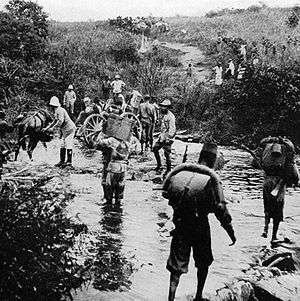Battle of Tabora
| ||||||||||||||||||||||||||
The Battle of Tabora (French: Bataille de Tabora; 8–19 September 1916[1]) was a military action which occurred around the town of Tabora in the north-west of German East Africa (modern-day Tanzania) during World War I. The combat formed part of the East Africa Campaign and was the culmination of the Tabora Offensive in which a Belgian force from the Belgian Congo crossed the border and captured both Tabora (the largest town in the interior of the German colony) and the nearby settlement of Kigoma, pushing the German colonial army back. The victory not only left much of the Ruanda-Urundi territory under Belgian military occupation but gave the Allies control of the important Tanganjikabahn railway.
References
- 1 2 3 4 Tucker 2014, p. 1529.
Bibliography
- Tucker, Spencer C., ed. (2014). World War I: The Definitive Encyclopedia and Document Collection (2nd ed.). Santa Barbara, CA: ABC-CLIO. ISBN 978-1-85109-964-1.
Further reading
- Daye, Pierre (1918). Avec les vainqueurs de Tabora: notes d'un colonial belge en Afrique Orientale Allemande. Paris: Perrin.
- Delpierre, Georges (2002). "Tabora 1916: de la symbolique d'une victoire". Belgisch Tijdschrift voor Nieuwste Geschiedenis. 3–4: 351–81.
- Various (1929). Les campagnes coloniales belges, 1914-1918. II: La campagne de Tabora. Brussels: Service historique de l'Armée.
Coordinates: 5°01′00″S 32°48′00″E / 5.0167°S 32.8000°E
